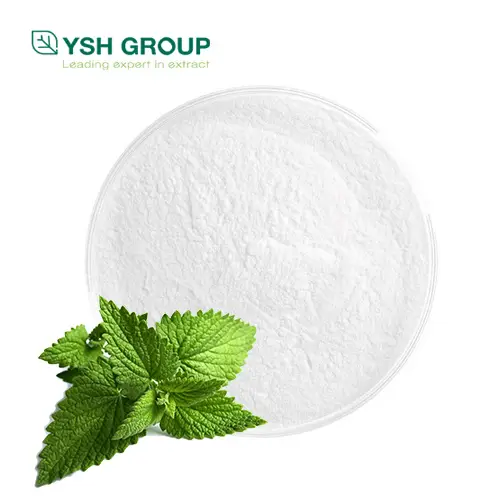Stevia Extract / Rebaudioside M
-
CAS Number: 1220616-44-3
-
Assay (Dry Basis): 95.0%
-
Molecular Formula: C56H90O33
-
Molecular Weight: 1291.3 g/mol

Stevia Extract / Rebaudioside M
CAS Number: 1220616-44-3
Assay (Dry Basis): 95.0%
Molecular Formula: C56H90O33
Molecular Weight: 1291.3 g/mol
Type | Contents |
Product Name | Stevia extract |
Appearance | White |
Loss on drying | 1.15% |
Ash content | ≤1% |
Assay(dry basis) | ≤95.0% |
pH | 5.92 |
Pb | ≤1.0 ppm |
Tatal As | ≤1.0 ppm |
Ethanol residue | ≤5000 ppm |
 Stevia extract
Stevia extractby United Nations Playlist -280 videos -6,765 views
 Description
DescriptionRebaudioside M (Reb-M) – Natural Sweetener with Sucrose-Like Taste
Rebaudioside M (Reb-M) is the steviol glycoside with the closest taste to sucrose, among more than 60 identified steviol glycosides. Its bitterness is significantly reduced compared to other steviol compounds, making it ideal for food and beverage formulations that require a clean, natural sweetness.
With a sweetness level 250–350 times higher than sucrose, Reb-M not only enhances flavor but also provides excellent cost-effectiveness, offering an optimal sweetness-to-price ratio. Advanced production methods, such as enzymatic synthesis, ensure Reb-M products are economically competitive, often matching or surpassing the benefits of traditional sugar.
This combination of natural taste, high sweetness, and economic advantage makes Reb-M a preferred choice for manufacturers aiming to create sugar-free, low-calorie, and clean-label products.
 Specifications
SpecificationsState | Powder |
Sieve Analysis | 100% pass 80 mesh |
Methanol residue | ≤200ppm |
Total microbial count | 120 CFUIg |
Total microbial count | <3000cfu/g |
Mold microbial count | 40 CPN/g |
Coliform | <3 MPN/g |
Enterobacterales | ≤10 CFU/g |
Staphylococcus Aureus | ≤10 CFU/g |
Salmonella | N.D |
 Storage
StorageStorage Instructions for Stevia Extract / Rebaudioside M
Store in a cool and dry place to preserve quality.
Do not freeze to maintain stability.
Keep away from strong light and heat to prevent degradation.
 Applications of Stevia extract
Applications of Stevia extractStevia Extract – Natural, High-Potency Sweetener
Stevia (Stevia rebaudiana Bertoni) extract is naturally rich in steviol glycosides, including Rebaudioside M and Rebaudioside A, which are 250–400 times sweeter than sucrose yet calorie-free and remarkably close in taste to sugar. This makes it a highly popular natural sweetener worldwide.
Beyond its sweetness, stevia extract contains polyphenols and chlorogenic acid, offering multiple health benefits:
Blood Sugar Support: Promotes insulin sensitivity and slows sugar absorption, aiding in glycemic control.
Cardiovascular Health: Helps regulate blood lipids and supports heart function.
Anti-Aging & Antioxidant Effects: Scavenges free radicals to protect cells and delay aging.
Enzyme Regulation: Inhibits angiotensin-converting enzyme, contributing to overall metabolic health.
Stevia extract combines natural sweetness with functional health benefits, making it ideal for beverages, foods, supplements, and wellness products.

Stevia Extract – Stable, Safe, and Sustainable Sweetener
Stevia extract demonstrates excellent stability under high temperatures, acidic, and alkaline conditions, making it ideal for a wide range of food processing applications, including beverages, baked goods, and dairy products.
It has received safety certifications from reputable organizations such as the FDA and EFSA, ensuring consumer confidence. Additionally, its sustainable cultivation requires low water usage and minimal pesticides, while enzymatic synthesis can enhance production efficiency.
As a natural, highly sweet, calorie-free, and functional ingredient, stevia extract is increasingly recognized as a clean-label solution, supporting global low-sugar diets and innovative functional food formulations.
 Why choose us
Why choose usNatural and Safe Stevia Extract
The Stevia rebaudiana extract is sourced from natural Stevia leaves and obtained using advanced extraction techniques such as enzymatic hydrolysis and membrane separation. These physical, eco-friendly methods avoid harmful chemical solvents, ensuring a safe and sustainable production process.
This extract is gentle and well-tolerated, supported by extensive research and multiple safety assessments. When used within recommended dosage limits, it generally causes no adverse effects. Free from artificial additives, harmful residues, and synthetic chemicals, it places no extra burden on the body.
Highly favored by individuals pursuing natural, clean-label, and functional food solutions, stevia extract aligns perfectly with modern healthy dietary trends, offering a safe, effective, and environmentally responsible sweetening option.
Explore the YSH Herb Blog for expert articles on herbal extracts and wellness. Follow us on Facebook at YSH Group for updates and community insights.